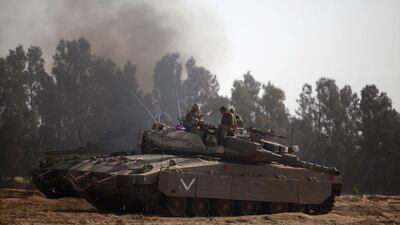A single incident at the weekend – the reported capture by Hamas on Friday of an Israeli soldier through a tunnel – illustrated in stark fashion the layers of deception Israel has successfully cast over its attack on Gaza.
Yesterday, as the army indicated it would start limited withdrawals, Israel suggested Hadar Goldin was dead, possibly buried in a collapsed tunnel as Israel bombarded the area in which he was seized. His family said he was being left behind.
Israeli officials and media did not view Hamas’s operation dispassionately. Goldin was not “captured” but “kidnapped” – as though he was an innocent seized by opportunistic criminals.
Astoundingly, many western journalists followed Israel’s lead. The Times of London’s front page blared: “Kidnapped in Gaza”, while the Boston Globe called him the “abducted Israeli soldier”.
From western reactions, it was also clear the soldier’s capture was considered more significant news than any of the massacres of Palestinian civilians over the past weeks.
Israel’s cynical calculus – that one soldier is more valuable than large numbers of dead Palestinian civilians – was echoed in the diplomatic and editorial corridors of Washington, London and Paris.
Misleading too was the theme that, in attacking soldiers and seizing Goldin, Hamas had violated a 72-hour humanitarian ceasefire.
CBS reporter Charlie D’Agata was among those who, in parroting Israeli briefings, inadvertently exposed the deceit. The soldier was “suspected of being kidnapped during an operation to clear tunnels – crucially, [officials] say, this happened after the ceasefire was supposed to take place”.
So if a ceasefire was in place, what were Goldin and his comrades doing detonating the tunnels in which Israel says Hamas is hiding? Were Hamas fighters supposed to simply wait to be entombed during the pause in hostilities? Or was Israel the one violating the ceasefire?
And then there was the explosion of military fury as Israel realised its soldier was missing. Israeli correspondents suggested the notorious “Hannibal procedure” had been invoked: the use of all means to stop a soldier being taken alive, including killing him. The rationale is to prevent the enemy gaining a psychological advantage in negotiations.
The unleashing of massive firepower appeared designed to ensure Goldin and his captors never made it out of their tunnel, but in the process dozens of Palestinians died.
It was another illustration of Israel’s absolute disregard for the safety of civilians. At least three-quarters of the more than 1,700 Palestinians killed so far have been non-combatants, while almost all Israeli casualties have been soldiers. Another UN school was hit yesterday, killing at least 10 Palestinians seeking refuge from Israeli air strikes.
Israel’s official justifications for taking the fight into Gaza have been layered with deceit too. Prime minister Benjamin Netanyahu has argued that Israel was dragged into a war of necessity. US president Barack Obama echoed him: Israel had a right to defend itself from rocket fire out of Gaza. Later, the pretext would become Israel’s need to destroy the “terror tunnels”.
The logic was deeply flawed. Israel is occupying and besieging Gaza, conferring on its inhabitants a right under international law to fight for their freedom. How does the oppressor, the lawbreaker have a right to self-defence? If Israel objects to being scratched and bruised, it should stop choking its victim.
Equally significantly, Israel has obscured the truth that it picked this particular round of its ongoing confrontation with Hamas – and did so entirely cynically.
A BBC reporter recently confirmed with an Israeli police spokesman that the group behind the abduction in June of three Israeli teenagers in the West Bank – the trigger for an Israeli campaign against Hamas – was a lone cell.
Claiming precisely the opposite – that he had cast-iron proof Hamas was responsible – Mr Netanyahu gave the army free rein to arrest hundreds of Hamas members and smash the organisation’s institutions in the West Bank.
The crackdown created the necessary provocation: Hamas allowed its Gaza factions to start firing limited numbers of rockets. Analyst Nathan Thrall notes that Hamas had impressed the Israeli army until that point by enforcing the ceasefire agreed 18 months earlier, even though Israel violated the terms by maintaining Gaza’s siege. Now the rockets gave Mr Netanyahu an excuse to strike.
So what was Mr Netanyahu’s real reason for going into Gaza? What were these many deceptions designed to hide?
It seems he wanted to end a strategic threat: not Hamas rockets or tunnels, but the establishment of a unity government between Hamas and its long-time rivals Fatah.
But Hamas’s unexpectedly impressive martial display against Israel – killing dozens of soldiers, firing long-range rockets into Israel and briefly closing the airport – may have changed the calculus again.
Now, Mr Netanyahu may need Palestinian unity, at least on his terms, to undermine Hamas’s gains.
As Israel began its attack on Gaza, Mr Netanyahu warned there could never be "any agreement in which we relinquish security control" of the West Bank. He was ruling out any hope of Palestinian statehood. A "demilitarised" entity, heavily circumscribed and absolutely dependent on Israel and the US, seems to be all that is on the table.
Allowing Palestinian leader Mahmoud Abbas and Fatah into Gaza could justify loosening the siege. But only as long as Mr Abbas agrees to remove Hamas’s military infrastructure and export to the coastal enclave the model he has established in the West Bank – of endless accommodation to Israeli and US dictates.
Jonathan Cook is an independent journalist based in Nazareth


